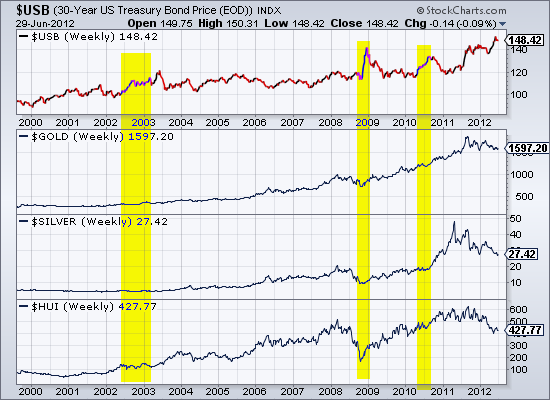Stocks & Equities

Faber on the eurozone crisis:
In my view the markets are rallying because they were grossly oversold. When markets are grossly oversold, especially markets of Portugal, Spain, Italy, France, then any news that is not disastrous news propels stocks higher.
‘I think that combined with seasonal strength in July, the rally has carried on somewhat. But it is another cosmetic fix, a quick fix that does not solve the long-term fundamental problem of over investment in the euro zone. And what it does, basically, it forces Germans to continue to finance people in Spain and Portugal and Greece that are living beyond their means.’
‘If I were the Germans, if I were running Germany, I would have abandoned the eurozone last week…It is a costly decision, but losses are there and somewhere, somehow, the losses have to be taken. The first loss is the banks. In the case of Greece, one should have kicked out Greece three years ago. It would have been much cheaper.’
On whether he’s picking up European equities:
‘Yes. In Portugal, Spain, Italy, and France, the markets are either at the lows of March 2009, or lower. Along with bad companies and the banks, there are also reasonably good companies. Stellar companies, but they have been dragged down. I see value in equities, regardless of whether the eurozone stays or is abandoned.
‘[I’m buying] anything that has a high yield, or what I perceive to have a relatively safe dividend. In other words, I do not expect the dividends to be slashed by 90%…I am not buying banks, but maybe they could rally. I am just not buying them because I think there will be a lot of equity dilution and recapitalization. I’m not that keen on banks.’
….read more about what currencies he is recommending go HERE or view the entire video below
The richest and most successful traders all limit their losses on trades that don’t work out by practicing sound money management. To most this usually means using stop orders triggered if a certain price is hit. Nowaday’s markets are so remarkablly volatile there is one successful trader who has a different idea on money management below:
“I and some clients have tried to use stops, but I have found that this is only marginally successful, especially in these markets with wild intra day swings. When the market comes down, stops you out and then goes in the predicted direction, it can be devastating emotionally.
The only way that I have found to limit losses to a manageable level is to trade lightly enough to sleep soundly. You’re not going to get rich overnight. This is an extended process, but over time, you should handily outperform guaranteed instruments as you build assets” – Stephen Todd of the Todd Market Forecast
Stephen Todd’s Success: Since 1993, we have given instructions to mutual fund investors to be either 100% invested or 100% on the sidelines. According to Timer Digest, of Greenwich, CT, which monitors over 100 advisory services world wide, we are only one of fourservices to have beaten the buy and hold over the past ten years.
We were rated # 1 for the past ten years at year end, 2003, 2004 and 2005. In 2006, we slipped to # 3. At the end of 2007 we were ranked # 4.
Since then, we have dropped out of the top ten for stocks, but we were bond timer of the year at the end of 2007 and 2008 which means we were ranked number 1 both years. We were rated # 1 in gold timing for 1997 and again in 2011.

One of the most famous oil price forecasters BP Capital’s T. Boone Pickens talks about the prices for natural gas and oil. He speaks with Trish Regan on Bloomberg Television’s ‘Street Smart.’
For Mr Pickens sub-$100 oil prices for Brent Crude marked the bottom of the sell-off and the only way is up, though he sees the US president manipulating the WTI price with the release of strategic reserves this autumn. Brent Crude is broadly the price the Middle East earns from exports.

“France is rotten,” said a friend yesterday. “I don’t know why you came back. Half the people are broke. The other half are crazy…
“…and you foreigners still come here, pay $1 million for a hole- in-the-wall apartment…and walk around the city and step in dogsh*t.”
Yes, dear reader, that is a fair description of France circa 2012. The new president, Francois Hollande, says he won’t wait for the private sector to create jobs. He will do it himself. He’ll hire more teachers. Never mind that the payback on educational spending is zero — or less. It sounds good to the lumpen-voters.
And how will he pay for these new teachers? This week, he is expected to raise taxes on the rich. The top marginal rate, he says, will go up to 75%. And the wealth tax will go up too.
In short, the elites who control France will soon control, directly, more of it…and more of the rich will move to Switzerland, England or Belgium.
Rotten…rotten…rotten…
But here at The Daily Reckoning, we like rotten countries. For example, in a state of even more advanced decay, there is Argentina, where president Cristina Fernando de Kirchner has just announced a solution to the housing problem.
We pause to give dear readers a quick résumé of how housing got to be a problem south of the Rio Plata. In the ’80s, the generals who ran Argentina tried to pay their bills by printing money. This led to consumer price increases of more than 1,000% per year. They had to throw out one currency, start a new one, and then throw that one out too. And then there was the war with England. Eventually, people got sick of it and threw the generals out. Then, President Carlos Menem promised a “hard” currency for Argentina, which he would achieve by tying the peso directly to the dollar.
No one is more persuasive than an Argentine when he is trying to borrow money. And since the currency risk was eliminated — or so investors thought — the Argentines soon were able to borrow more money than they could possibly repay, which led to the biggest default — about $100 billion — in world history.
The official inflation rate is now still in single digits. But the actual inflation rate — which is apparently illegal to report — is near 25%. This — combined with the fact that when you lend Argentines money they don’t pay it back — greatly reduces the availability of credit…and housing. People have to pay all cash…or nearly all-cash…to buy a house.
Well, you can imagine what America’s housing market would look like if people had to save money before buying a house. There wouldn’t be so many houses. And that’s why there aren’t so many houses in Argentina. And many of those that were built in the past are not in great shape.
So, in comes Cristina. Rather than give any hint that her predecessors and her own political party bear any responsibility for the housing problem, she offers another crackpot solution.
We will come to that in just a minute. We just want to point out that this situation is classic. Government causes problems. It then offers solutions that make them worse.
On a macro level that is what is happening in the US. The feds created a credit-based economy, increasing the supply of credit 50 times in the past 50 years. This huge swell of credit swamped the entire world…leading to (among other things) the explosion in factory output in China…the bubble in housing in the US…the big increase in wealth for the ‘rich’…the blow up in ’08-’09…high unemployment…and little real growth.
But rather than recognize that, they set the house on fire…the feds arrive on the scene like firefighters, pretending to put it out. Trouble is, they keep adding tinder — more credit!
The feds have added $4.39 trillion to the national debt since Obama moved into the White House. On an accrual basis, they’ll add $20 trillion by the end of this year.
And that’s the fiscal side. Over on the monetary side, the Fed has been doing its part. It has added $2 trillion to its balance sheet (the foundation of the US money supply) since the crisis blew up in ’08-’09.
Even with all that gasoline and dry sticks, they’ve had trouble keeping the fire going. Consumers…and households…have been a wet blanket. They’re trying to de-leverage. That is, they want to get rid of credit, not add more.
But the government comes to the rescue with more student loans, housing loans, bailouts, subsidies, free bread at home…military circuses abroad.
And Paul Krugman, Joseph Stiglitz, Larry Summers et al urge the feds to do even more! In our view, they’ve done enough damage already.
Not that we’re complaining. It’s all very entertaining and instructive.
But today’s note is about rotten economies. And while the US is developing large brown spots and a sticky-sweet smell…it’s not nearly as ripe as some others. For example…Argentina. Here’s Cristina’s solution to the housing problem; if the private sector won’t make mortgage loans, the government will:
|
Gee, you’d think that people would line up around the block to get that kind of money…which is exactly what they do. So, how do they decide who gets a loan? By lottery! Here’s the report:
|
Why didn’t you think of that, Mr. Market? You dumb-bell. All you can think of is tired old formulas — protecting the value of the money…then letting willing buyers and sellers work out for themselves how much credit they want…and at what price.
Bo…ring!
C’mon, Mr. Market…use some imagination…!
Bill Bonner
for The Daily Reckoning

Since founding Agora Inc. in 1979, Bill Bonner has found success and garnered camaraderie in numerous communities and industries. A man of many talents, his entrepreneurial savvy, unique writings, philanthropic undertakings, and preservationist activities have all been recognized and awarded by some of America’s most respected authorities. Along with Addison Wiggin, his friend and colleague, Bill has written two New York Times best-selling books, Financial Reckoning Day and Empire of Debt. Both works have been critically acclaimed internationally. With political journalist Lila Rajiva, he wrote his third New York Times best-selling book, Mobs, Messiahs and Markets, which offers concrete advice on how to avoid the public spectacle of modern finance. Since 1999, Bill has been a daily contributor and the driving force behind The Daily Reckoning. Dice Have No Memory: Big Bets & Bad Economics from Paris to the Pampas, the newest book from Bill Bonner, is the definitive compendium of Bill’s daily reckonings from more than a decade: 1999-2010.
Special Video Presentation: Urgent Message About Your Net Worth The single, solution-packed book that could… literally… mean the difference between growing wealthy or suffering an ugly, vicious decline in your net worth. Discover how to claim a FREE copy of this book, right here.
Read more: How Government Spending Continues to Add Fuel to the Fire http://dailyreckoning.com/how-government-spending-continues-to-add-fuel-to-the-fire/#ixzz1zV77Sfdm














